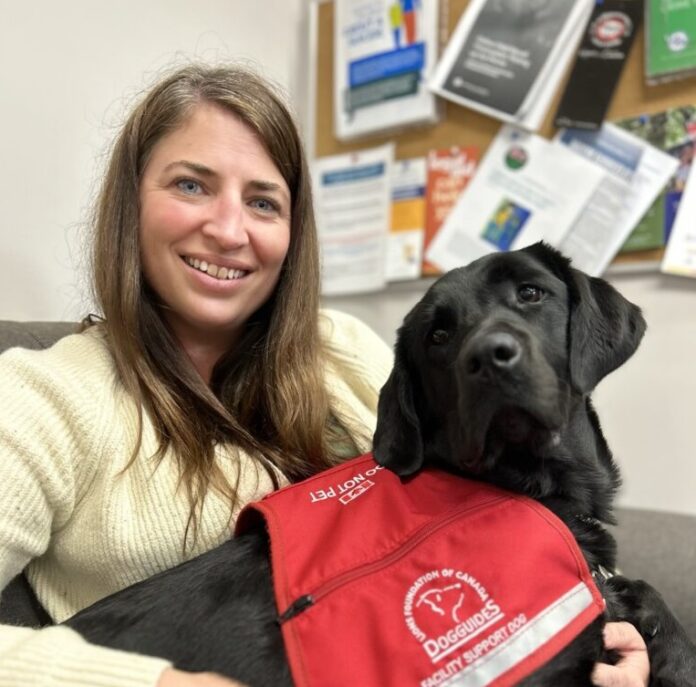The newest member of Trail’s victim services unit has has already begun making a positive impact on victims and witnesses of crime or tragedy. Ireland is a black lab/golden retriever cross who turns two in January. We spoke with her handler, Jenn Penney.
What sort of training did Ireland have to go through?
Ireland comes from the Lions Foundation of Canada Dog Guides. At their facility they purpose breed these dogs for all of their programs and essentially start training them as soon as they’re born. They expose them in a safe environment to different stimuli to calm their nervous systems. At eight weeks old they go to their puppy raiser, or foster, and start basic training. At about a year old, depending on the dog, they go back to the facility where they are placed in a more intensive training program. They’re selected for whatever program best suits their personality.
What was Ireland trained to do?
She is trained to be very calm, non-reactionary, to provide a positive response to extreme emotional response by people she works with, along with a few tricks to help break the ice. It’s particularly helpful for kids experiencing a traumatic incident.
How did you get paired?
I applied to the program in February. I had to go through some interviews, write some essays, do a house tour and tell them about my work and victim services because we do a little bit of everything. We respond to all sorts of different crimes as well as critical incidents and tragedy. We’re hopping from case to case. We also do a lot of public education. They selected Ireland because of her temperament and energy level. She can be playful but also has this amazing calmness. She has the energy to jump from situation to situation and different environments. She can even be in a courtroom setting, in a witness box with a victim or witness testifying in a trial.
Does she go everywhere with you?
She comes to work with me and will deal with whatever cases come up. I’m in the office Monday to Thursday 8:30 to 4:30. She will come out to the field with me. I have to get consent from the client if they want to interact with the dog, make sure there are no allergies and the environment is safe for her, and we’ll deploy her as appropriate.
She gets a lot of work, but it’s really important for these dogs to get time off as well. Our trainers told us the dogs in this program tend to work a lot harder than dogs in other programs because they are so mentally stimulated. They explained it this way: Ireland doing her job might consist of sitting beside somebody giving a police statement. Ten minutes of her doing that is the equivalent of her running for an hour. It’s because she has to go against all her instincts to stay really calm.
When the vest comes off at the end of the day it’s important she has time to just be a dog. Her demeanour changes. She loves playing with other dogs and me and my family. I’ve got a couple of kids she adores.
Do other victim services units have support dogs?
Yes, several. In fact, I was inspired by a few of them. We got to meet them at victim service symposiums. She’s been here for three weeks and she’s had a few clients so far. The impact she’s had on them is nothing short of amazing. It made this whole process so worth it. The way she’s able to make people feel so relaxed while they’re experiencing a really difficult thing, having to talk to police about something traumatic that’s happened to them … it’s amazing how at ease it can put these clients.
She hit the ground running. Of course we have to keep up on her skills and make sure we practice. Because she comes from an accredited facility, she has to undergo testing and assessments and ongoing training. There’s a really high standard she’s held to. She’s going to be a hard worker.
What is the difference between therapy dogs and support dogs?
Therapy dogs are usually family pets who may go through some training. Those dogs can go into long-term care homes and may do hospital or hospice visits. But there’s no ongoing training, unlike dogs like Ireland. It’s important people know the difference. Therapy dogs don’t have public access rights whereas service dogs do. That’s why people might see me out and about with her going into stores. She’s identifiable by her red vest with the Lions Foundation logo. Her vest says “do not pet,” but of course when she’s with me and my clients, they do get to pet her.






